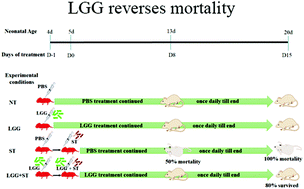Lactobacillus rhamnosus GG reverses mortality of neonatal mice against Salmonella challenge
Abstract
Pathogenic infection is one of the major causes of death in newborns. Antibiotic based therapies are still the major mode of treatment for infection. Increased usage of antibiotics leads to selective evolution of microorganisms and causes diseases in adulthood. Attempts to develop alternatives to antibiotics did not yield much success. A recent viable trend is to identify novel probiotics that could alleviate problems associated with over usage of antibiotics. We screened three different Lactobacillus species to establish their efficacy in neonates in protecting against Salmonella challenge. The methodologies employed are metagenomics, metabonomics, transcriptional profiling, molecular assays and behavioral studies. Among the three probiotics used, only Lactobacillus rhamnosus GG (LGG) treatment of the neonates resulted in rescuing of 80% of the Salmonella-infected mice. We have shown that LGG (MTCC #1408) can prevent Salmonella mediated infection in neonates. In the current report, results from histopathology, gene expression, neutrophil infiltration, metabolite and metataxonomic profiling, and protein level data suggested that LGG treatment of the neonates enhanced anti-inflammatory cytokine expression and increased the gut barrier function. The current report establishes the potential use of LGG in clinical intervention of infectious diseases.



 Please wait while we load your content...
Please wait while we load your content...